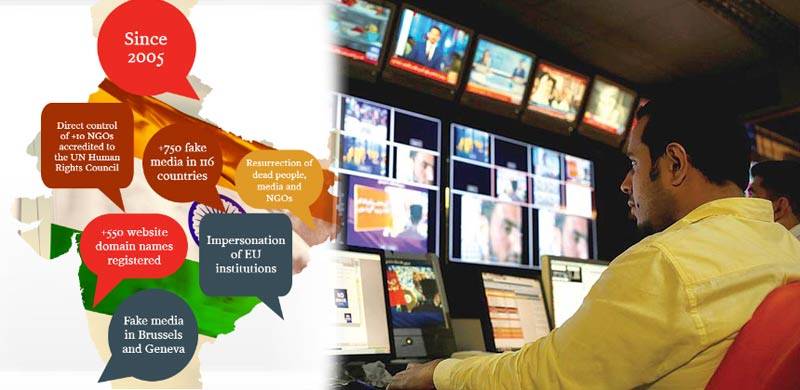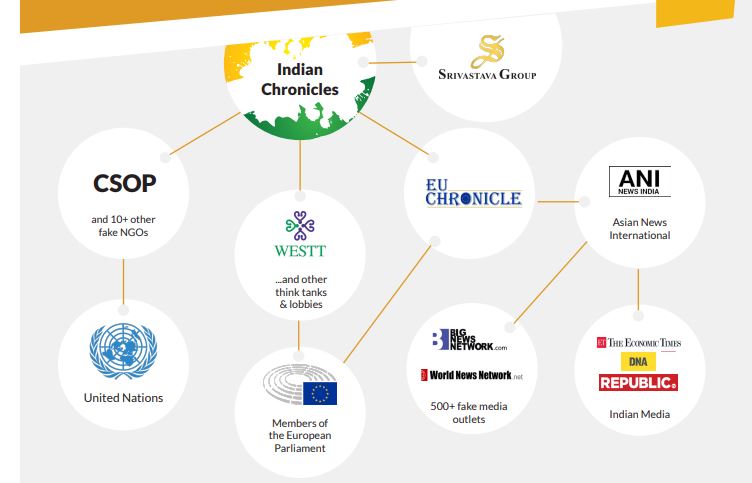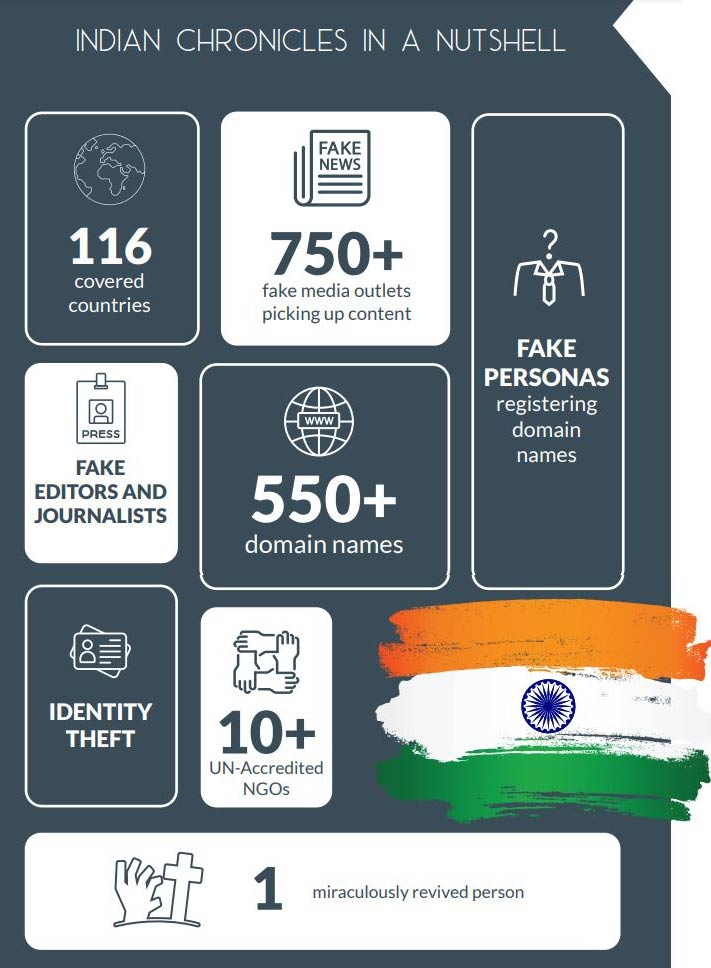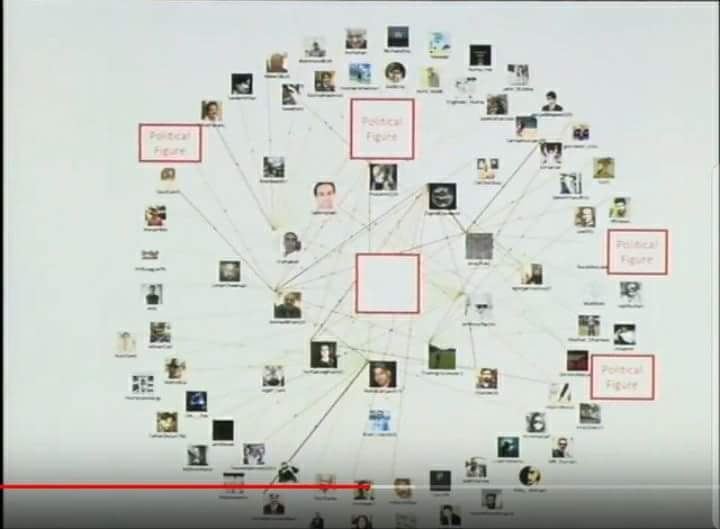
The recently exposed India's disinformation campaign to tarnish Pakistan globally has opened a new Pandora’s box. What were the motives, resources and forces behind the Indian Chronicles? How could Pakistan be unaware of this? Now that they have found out, how should Pakistani institutions respond? In a recent interview I addressed these questions.
We need to look at this disinformation campaign as a tool of hybrid warfare, also popularized in Pakistan as the “fifth-generation warfare” (5GW). During the Cold War, the United States (and the Soviet Union)employed a similar propaganda tools to berate their enemies. As far as India and Pakistan are concerned, they are also engaged in a kind of cold war. Over the past 73 years, they have fought four wars and continuously engaged in blame games. The disinformation tactic unearthed in the Indian Chronicles appears to be a product of this continued Cold War in the subcontinent.
There is no question with regard to who spearheaded this campaign. It could not have been possible without the involvement of the Indian state. Operations like this are managed covertly, behind the cover of "private institutions". Since 2005, 750 outlets were created to propagate fake news. What was their motive? To discredit Pakistan’s legitimacy of the Kashmir cause by fabricating misinformation against Pakistan and presenting it as a country where human rights are violated, and people live in absolute misery. The issue of Kashmir has a special place in Pakistan. Pakistan considers raising its voice for Kashmiris in platforms likethe UN as its duty. The so-called Chronicles were perhaps used an attempt to counter Pakistan's voice against Indian atrocities in Kashmir by shifting the world’s focus towards what's going on inside Pakistan, in Balochistan and other regions in Pakistan.
We cannot deny that there are no human rights issues in Pakistan, just as there are in India, and in fact, in all other countries. But the problem is the grossly disproportionate representation of human rights violations in Pakistan, which seems to be the sole purpose of those 750 news outlets.
Interestingly, one of the major distribution networks - the ANI - is also a partner of the international news agency Reuters and has shares in its parent company Thomson Reuters Corporation. So we can see that the mainstream media has been involved in it.

The bigger question is why we did not know about this before. There was a trivial mention and a news report about it once or twice but the way it has been exposed now by the EU DisinfoLab, with evidence, facts and figures, was never done before.
Disinformation is a global issue
Although it’s a matter of concern that we had been unaware of India’s clandestine work against Pakistan for many years, the tactic of spreading fake news is widely employed today to gain political mileage and influence the public opinion. We saw this happening in the 2016 US presidential elections, when an exceptionally large volume of fake news circulated in America, mostly favoring the now-outgoing US president Trump. Similarly, fake news played a major role in Brazil. In fact, many critics of Modi’s regime in India have raised concerns that there are established cells in social media platforms like WhatsApp which fan propaganda. We also know that big news and media outlets like DNA, Republic and The EconomicTimes, all of which have large followings, also pick stories from the ANI. Even members of European parliaments and the UN may have cited these sources, which have now been revealed to be disinformation networks.
Global hotspots where International public opinion is constructed
There are three or four places which are extremely critical in a geopolitical sense today: New York which houses the UN headquarters; Geneva which houses the headquarters of various UN agencies, like the ILOand Human Rights Commission; Brussels where the EU headquarters are located; and Washington, D.C., the capital city of USA. If we look at the details of the Indian Chronicles, at least 750 fake outlets, with more than 550 registered domain names, covered up to 119 countries in where fake news were spread. These aren’t insignificant numbers.
What were the Pak Missions abroad doing?
One wonders what Pakistani missions and embassies were doing in the four power centers of the world while disinformation campaigns were being carried out there with such openness. One also wonders whether Pakistan’s Foreign Office’s press information staff are trained enough to handle such situations. The nature of media has obviously changed in the past 20 or so years; most people in the developed world have turned away from “old school” newspapers and TV. The new information age is digital. Even in Pakistan, the use of social media is on a steep rise, with millions of Pakistanis getting their daily news from platforms like Facebook, Twitter, and Instagram.
Sadly, our information department does not seem adequately trained or equipped to deal with these new trends. The Pakistani civil service has not adapted to changing times. Our diplomats seem to be under such incessant pressure to achieve their political and trade objectives, they hardly seem equipped enough to spot, let alone deal with, anomalies like the disinformation spewed by the “Indian Chronicles”.
Information departments Are Ill-equipped to deal with digital media
The discovery of Indian Chronicles is a big wake-up call for Pakistan, as we were apparently unaware of the operation’s existence for 15 years! We must think along these lines now: If one Srivastav group is exposed, there is a likelihood that other such groups may still be out there that we aren’t aware of yet.
Unfortunately, the information departments go to extreme lengths in praising the government of the day while vilifying the opposition. Granted, governments have a right to publicize their achievements. But they equally have a responsibility to address, check and counter the content published elsewhere that undermines the country’s interest. Pakistanis often complain about the BBC and CNN and allege that they are prejudiced against the country. Many international news networks admittedly have their own governments and Western (erroneously termed as ‘global’) security concerns to look after. The question is whether our foreign office or our foreign missions even have enough capacity to have their voice included in foreign press like CNN, Washington Post, Fox etc.? There is hardly ever an interview of Pakistani diplomats. I have heard Pakistanis complain about the exacting nature of the task involved in facing foreign analysts and mediapersons.

Capacity and capability to address fake news
It is time to create the capability and capacity to detect fake news, it isn’t rocket science. In fact, the large part of it is deceptively simple. We can start with checking news websites’ “About us” sections to see who are the people involved in running them; whether or not they are real people. Secondly, where do their funds come from? Whose viewpoint or agenda are they likely to be pushing? Thirdly, look at the quality of the news that’s being offered. One does not expect to find silly mistakes like spellings in credible sources, whose primary purpose is not to push an “agenda” but to provide facts. Competent and credible sources simply deliver better quality content.
Instead of doing this and improving our capacity for handling smear campaigns, what we find is that our ministers are too busy slinging dirt on the opposition. The Foreign Minister must feel the urgency of tackling the new situation that has just come to the fore. Instead, he too is busy (like the Prime Minister, and the interior, interprovincial and former railway ministers) talking about the opposition all day long.
Then, the discovery of the Indian Chronicles by a foreign organization also brings in relief our own intelligence services’ failure to unearth them. Perhaps they did know about the operation, but even so they did not know enough to counter the massive damage that it may have caused by now. Pakistan’s premier intelligence agency is tasked to check for foreign threats, and it has to review whether it has sufficient capacity vis-à-vis fake news spreaders and Srivastav groups.
Check fake news but let’s not deny human rights violations
It is important to note that showing alarm over news outlets spewing disinformation about Pakistan does not equal denying the incidence of human rights violation in the country. Such incidents occur sadly rather frequently. The primary issue is the way they are being presented by these news networks, i.e. disproportionately and overblown. The other issue, which is for us to ponder, is that whereas in America (for example), there are active organizations like ACLU to defend civil rights liberty and keep the government’s heavy-handedness in check, such organizations in Pakistan (like the HRCP) are much weaker. This is something that we cannot afford to neglect any longer.
However, we must also not forget the Indian Chronicles was something that can rightly be called a “sting operation” in the context of hybrid warfare. Indians who are now telling Pakistan not to “overreact” and to set our own house in order first should remember that disinformation campaigns serve their interests no more than ours. In fact, to them I would say that unless you are your government’s spokespersons (who are the only ones that can possibly benefit from stringing lies together to increase the public support of the government), you are even morally obligated to condemn this “exposé” rather than stand by it. Lies reflect worse on their spreaders than the ones they are spread about. And any kind of disinformation is part of hybrid warfare.
End spotting 'traitors' inside the country and look outside
The exposé should also have our government rethinking many of its own policies and attitudes towards its own citizens. Out of all the 750 outlets or 550 domain names, not a single was Pakistani. Had Pakistani news agencies or any other Pakistani citizen been involved, the EU DisinfoLab would have had no hesitation to name him or her as well. The Pakistani government has a list of a few dozen individuals (like Manzoor Pashteen) whom it touts ad nauseum as being “traitors” or “Indian agents”. More people are added to the list at the government’s convenience. (Even these comments from me would have someone inevitably turn around and name me a traitor… it’s so predictable.) One does not deny fake news are not spread internally. After the 2013 elections, it was widely propagated that as many as 35 seats in the national assembly had been misappropriated. If anything, that was the biggest fake news of the decade.
The government must take the cue and shift its focus of spotting hatemongers in the world’s biggest power centers, from where they can damage Pakistan incomparably more than the worst of fake news spreaders inside Pakistan’s boundaries. We need a good team of five or six experts to mine data and backtrack news websites and their sources. Obviously, it is not being suggested that the agencies are more paranoid about internal threats than real threats outside. But it is an undeniable fact that we urgently need a broadening of spectrum, both for dealing with internal and external threats, and also pinpointing why certain threats (like disenchanted citizenry) exist in the first place.

Apprise the international community
There is no need to create groups like Srivastav in response to the Indian Chronicles exposé, as many seem to be suggesting we should do. This issue must be raised in international forums, in the UN, the EU, the US capital. The discovery of a similar disinformation campaign by Russia or China would have had the New York Times and CNN inundated by reports on it for days. We should at least remind the world as much as we can. There is no reason to ignore this.
While the West is inclined not to annoy India due strategic or economic interests, Pakistan needs to sensitise the international community. It is time to act.
https://www.youtube.com/watch?v=TBeaDw2A48M&t=12s
We need to look at this disinformation campaign as a tool of hybrid warfare, also popularized in Pakistan as the “fifth-generation warfare” (5GW). During the Cold War, the United States (and the Soviet Union)employed a similar propaganda tools to berate their enemies. As far as India and Pakistan are concerned, they are also engaged in a kind of cold war. Over the past 73 years, they have fought four wars and continuously engaged in blame games. The disinformation tactic unearthed in the Indian Chronicles appears to be a product of this continued Cold War in the subcontinent.
There is no question with regard to who spearheaded this campaign. It could not have been possible without the involvement of the Indian state. Operations like this are managed covertly, behind the cover of "private institutions". Since 2005, 750 outlets were created to propagate fake news. What was their motive? To discredit Pakistan’s legitimacy of the Kashmir cause by fabricating misinformation against Pakistan and presenting it as a country where human rights are violated, and people live in absolute misery. The issue of Kashmir has a special place in Pakistan. Pakistan considers raising its voice for Kashmiris in platforms likethe UN as its duty. The so-called Chronicles were perhaps used an attempt to counter Pakistan's voice against Indian atrocities in Kashmir by shifting the world’s focus towards what's going on inside Pakistan, in Balochistan and other regions in Pakistan.
We cannot deny that there are no human rights issues in Pakistan, just as there are in India, and in fact, in all other countries. But the problem is the grossly disproportionate representation of human rights violations in Pakistan, which seems to be the sole purpose of those 750 news outlets.
Interestingly, one of the major distribution networks - the ANI - is also a partner of the international news agency Reuters and has shares in its parent company Thomson Reuters Corporation. So we can see that the mainstream media has been involved in it.

Courtesy Disinfo Lab
The bigger question is why we did not know about this before. There was a trivial mention and a news report about it once or twice but the way it has been exposed now by the EU DisinfoLab, with evidence, facts and figures, was never done before.
Disinformation is a global issue
Although it’s a matter of concern that we had been unaware of India’s clandestine work against Pakistan for many years, the tactic of spreading fake news is widely employed today to gain political mileage and influence the public opinion. We saw this happening in the 2016 US presidential elections, when an exceptionally large volume of fake news circulated in America, mostly favoring the now-outgoing US president Trump. Similarly, fake news played a major role in Brazil. In fact, many critics of Modi’s regime in India have raised concerns that there are established cells in social media platforms like WhatsApp which fan propaganda. We also know that big news and media outlets like DNA, Republic and The EconomicTimes, all of which have large followings, also pick stories from the ANI. Even members of European parliaments and the UN may have cited these sources, which have now been revealed to be disinformation networks.
Global hotspots where International public opinion is constructed
There are three or four places which are extremely critical in a geopolitical sense today: New York which houses the UN headquarters; Geneva which houses the headquarters of various UN agencies, like the ILOand Human Rights Commission; Brussels where the EU headquarters are located; and Washington, D.C., the capital city of USA. If we look at the details of the Indian Chronicles, at least 750 fake outlets, with more than 550 registered domain names, covered up to 119 countries in where fake news were spread. These aren’t insignificant numbers.
What were the Pak Missions abroad doing?
One wonders what Pakistani missions and embassies were doing in the four power centers of the world while disinformation campaigns were being carried out there with such openness. One also wonders whether Pakistan’s Foreign Office’s press information staff are trained enough to handle such situations. The nature of media has obviously changed in the past 20 or so years; most people in the developed world have turned away from “old school” newspapers and TV. The new information age is digital. Even in Pakistan, the use of social media is on a steep rise, with millions of Pakistanis getting their daily news from platforms like Facebook, Twitter, and Instagram.
Sadly, our information department does not seem adequately trained or equipped to deal with these new trends. The Pakistani civil service has not adapted to changing times. Our diplomats seem to be under such incessant pressure to achieve their political and trade objectives, they hardly seem equipped enough to spot, let alone deal with, anomalies like the disinformation spewed by the “Indian Chronicles”.
Information departments Are Ill-equipped to deal with digital media
The discovery of Indian Chronicles is a big wake-up call for Pakistan, as we were apparently unaware of the operation’s existence for 15 years! We must think along these lines now: If one Srivastav group is exposed, there is a likelihood that other such groups may still be out there that we aren’t aware of yet.
Unfortunately, the information departments go to extreme lengths in praising the government of the day while vilifying the opposition. Granted, governments have a right to publicize their achievements. But they equally have a responsibility to address, check and counter the content published elsewhere that undermines the country’s interest. Pakistanis often complain about the BBC and CNN and allege that they are prejudiced against the country. Many international news networks admittedly have their own governments and Western (erroneously termed as ‘global’) security concerns to look after. The question is whether our foreign office or our foreign missions even have enough capacity to have their voice included in foreign press like CNN, Washington Post, Fox etc.? There is hardly ever an interview of Pakistani diplomats. I have heard Pakistanis complain about the exacting nature of the task involved in facing foreign analysts and mediapersons.

Courtesy Disinfo Lab
Capacity and capability to address fake news
It is time to create the capability and capacity to detect fake news, it isn’t rocket science. In fact, the large part of it is deceptively simple. We can start with checking news websites’ “About us” sections to see who are the people involved in running them; whether or not they are real people. Secondly, where do their funds come from? Whose viewpoint or agenda are they likely to be pushing? Thirdly, look at the quality of the news that’s being offered. One does not expect to find silly mistakes like spellings in credible sources, whose primary purpose is not to push an “agenda” but to provide facts. Competent and credible sources simply deliver better quality content.
Instead of doing this and improving our capacity for handling smear campaigns, what we find is that our ministers are too busy slinging dirt on the opposition. The Foreign Minister must feel the urgency of tackling the new situation that has just come to the fore. Instead, he too is busy (like the Prime Minister, and the interior, interprovincial and former railway ministers) talking about the opposition all day long.
Then, the discovery of the Indian Chronicles by a foreign organization also brings in relief our own intelligence services’ failure to unearth them. Perhaps they did know about the operation, but even so they did not know enough to counter the massive damage that it may have caused by now. Pakistan’s premier intelligence agency is tasked to check for foreign threats, and it has to review whether it has sufficient capacity vis-à-vis fake news spreaders and Srivastav groups.
Check fake news but let’s not deny human rights violations
It is important to note that showing alarm over news outlets spewing disinformation about Pakistan does not equal denying the incidence of human rights violation in the country. Such incidents occur sadly rather frequently. The primary issue is the way they are being presented by these news networks, i.e. disproportionately and overblown. The other issue, which is for us to ponder, is that whereas in America (for example), there are active organizations like ACLU to defend civil rights liberty and keep the government’s heavy-handedness in check, such organizations in Pakistan (like the HRCP) are much weaker. This is something that we cannot afford to neglect any longer.
However, we must also not forget the Indian Chronicles was something that can rightly be called a “sting operation” in the context of hybrid warfare. Indians who are now telling Pakistan not to “overreact” and to set our own house in order first should remember that disinformation campaigns serve their interests no more than ours. In fact, to them I would say that unless you are your government’s spokespersons (who are the only ones that can possibly benefit from stringing lies together to increase the public support of the government), you are even morally obligated to condemn this “exposé” rather than stand by it. Lies reflect worse on their spreaders than the ones they are spread about. And any kind of disinformation is part of hybrid warfare.
End spotting 'traitors' inside the country and look outside
The exposé should also have our government rethinking many of its own policies and attitudes towards its own citizens. Out of all the 750 outlets or 550 domain names, not a single was Pakistani. Had Pakistani news agencies or any other Pakistani citizen been involved, the EU DisinfoLab would have had no hesitation to name him or her as well. The Pakistani government has a list of a few dozen individuals (like Manzoor Pashteen) whom it touts ad nauseum as being “traitors” or “Indian agents”. More people are added to the list at the government’s convenience. (Even these comments from me would have someone inevitably turn around and name me a traitor… it’s so predictable.) One does not deny fake news are not spread internally. After the 2013 elections, it was widely propagated that as many as 35 seats in the national assembly had been misappropriated. If anything, that was the biggest fake news of the decade.
The government must take the cue and shift its focus of spotting hatemongers in the world’s biggest power centers, from where they can damage Pakistan incomparably more than the worst of fake news spreaders inside Pakistan’s boundaries. We need a good team of five or six experts to mine data and backtrack news websites and their sources. Obviously, it is not being suggested that the agencies are more paranoid about internal threats than real threats outside. But it is an undeniable fact that we urgently need a broadening of spectrum, both for dealing with internal and external threats, and also pinpointing why certain threats (like disenchanted citizenry) exist in the first place.

Apprise the international community
There is no need to create groups like Srivastav in response to the Indian Chronicles exposé, as many seem to be suggesting we should do. This issue must be raised in international forums, in the UN, the EU, the US capital. The discovery of a similar disinformation campaign by Russia or China would have had the New York Times and CNN inundated by reports on it for days. We should at least remind the world as much as we can. There is no reason to ignore this.
While the West is inclined not to annoy India due strategic or economic interests, Pakistan needs to sensitise the international community. It is time to act.
https://www.youtube.com/watch?v=TBeaDw2A48M&t=12s
